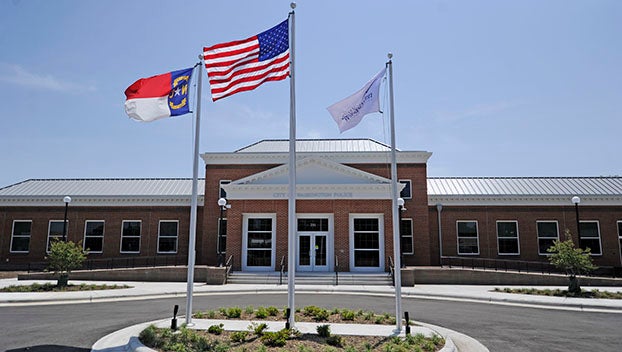BCCC Board of Trustees talks funds, future plans
Published 7:03 pm Monday, April 18, 2016

BCCC
MONEY TALKS: Mark Nelson, vice president of administrative services, presents budget requests to the Board of Commissioners Monday.
The Beaufort County Community College Board of Trustees had a busy day Monday, examining the college’s funding needs and the areas in need of improvement.
Starting with an early morning meeting with the Beaufort County Board of Commissioners, the board presented its request for an overall 10-percent increase in funding from the county, a total increase of $302,074, according to a press release.
BCCC presents its requests for the county a few times a year, updating the commissioners on important expenses to consider while they put together the budget for fiscal year 2016-17, which begins July 1.
The major capital funding requests include: overflow parking for Building 12 and replacing the HVAC system in Building 9. The two projects would cost about $300,000, the release stated.
Other large requests included a 4-percent increase in funds for salaries and benefits, and a $50,000 energy audit to give suggestions on how to reduce the college’s energy and maintenance costs over a 15-year period, according to the release.
Strategic planning
After meeting with commissioners, the Board of Trustees then transitioned into its retreat meeting agenda.
Dr. Barbara Tansey, president of BCCC, said one of the biggest retreat discussions revolved around the college’s five-year strategic plan.

CAROLINE HUDSON | DAILY NEWS
ENROLLMENT NUMBERS: Dr. Barbara Tansey, president of BCCC, explains how a program, like the concealed carry permit, can relate to full-time enrollment.
By outlining eight strategic directions, the Board of Trustees discussed its plans to keep the college moving forward, as well as areas in need of improvement. The plans included providing more personal enrichment courses, promoting community awareness about course options, maintaining its infrastructure, collaborating with more organizations and businesses, recruiting high-quality staff and ensuring curricula will meet the community’s needs.
Board members also voiced concern about increasing the number of full-time enrollment students, which increases tuition funds and opens the door for more funding at the state and federal levels. The college’s FTE numbers dropped after its decision to stop participation in the Federal Direct Student Loan program last year.
“We have a declining K-12 population. We have an increase in senior citizens. We don’t have new industries locating,” Tansey said. “We have to be realistic.”
Rick Anderson, vice president of student services, said there has been a big push within the high school environment, one that educates students on the options available at BCCC and why a two-year degree may be the right path.
“We are becoming more and more reliant on that high school population,” Anderson said. “I can’t help but think those efforts are going to bear fruit. How much fruit, I don’t know.”
He said discussions have begun about investing in a two-year, full-ride scholarship for high school seniors in Beaufort and the surrounding counties in BCCC’s service area. If the scholarship comes to fruition, it would be based on a GPA requirement and be presented as a prestigious accomplishment.
“We don’t need to be the backup plan anymore,” Anderson said.
“It adds a lot of prestige,” board member Russell Smith said. “I hate to hear a kid apologize for going to community college.”
Low response rate
The Board of Trustees also reviewed the results of a college employee satisfaction survey, although members were disappointed to see only a 25-percent response rate, a good portion of which was negative.
“To me, there was a lot more negative feedback,” said member Bill Wall. “For me, personally, I’m going to have a hard time dealing with that.”
Jay Sullivan, vice president of research, explained that low numbers are to be expected with an electronic survey, and such a low response rate usually results in more negative feedback.
Some of the negative feedback regarded institutional planning, spirit of cooperation among faculty, communication within and between departments and adequate pay.
Wall said it is hard to know if the feedback is an accurate representation of all faculty members, given the low number of responses.
“We’re going to identify two or three things that we think might make a difference,” Tansey said. “We’ll give it some effort to try to make things better.”
She said the departments can discuss how to better communicate with faculty without overwhelming them with information, as well as improve inter-departmental communication.
“One of the things that we discussed was continuing to expand opportunities for all the employees at the college to collaborate in cross-divisional work flows,” said Stacey Gerard, vice president of continuing education. “By bringing those employees together, they become more aware of each other’s work flows.”
Wall said he believes the college has a duty to its employees and students to ensure the best work environment, but the survey still left more questions than answers.

BCCC
BUDGETING: Board of Trustees chair Laura Staton and Commissioner Jerry Langley listen in on the budget talks Monday morning.





